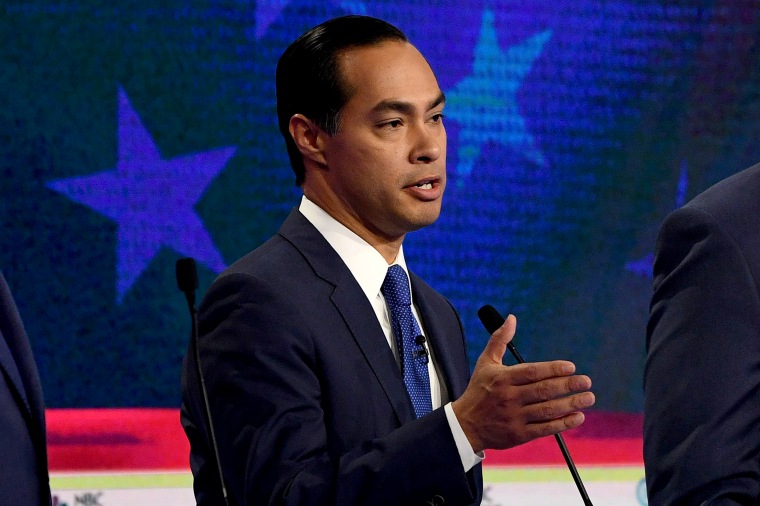Julián Castro heads to his second presidential debate Wednesday in Detroit with an eye on the next debate round scheduled for September.
Castro is closing in on qualifying to be onstage when the debates are held in his home state of Texas on Sept. 12 and 13 in what will very likely be a much smaller lineup.
After his successful showing in the Miami debates in June, Castro's fundraising surged and he hit and exceeded the 130,000 individual donors, including 400 unique donors in 20 states, needed to continue on to Houston.
But candidates also have to garner at least 2 percent in four polls approved by the Democratic National Committee to be in September's lineup.
Castro, a former Housing Secretary under President Barack Obama and former San Antonio mayor, hasn’t hit that measure. If he doesn’t qualify, Democrats could have a debate without a Latino in the candidate lineup, just days before the start of Hispanic Heritage Month in a state where Latinos are on track to be the largest population group in about three years.
Castro's campaign manager Maya Rupert said she is confident he will qualify.
That could happen soon if he repeats the success he had in Miami.
“What he showed people is he can go toe-to-toe with Trump and he has a strong vision for the future,” Rupert said.
Wednesday night’s debate is a chance for him to confirm to people who were introduced to him in the first debate that he is somebody they can support, as well as to continue to introduce himself to a wider group of Americans, she said.
Castro made his mark in the Miami debate by pushing his immigration proposal to charge people who cross the border illegally with a civil violation rather than a misdemeanor crime.
Along with a fundraising bump, his forcefulness on that issue led to a “huge bump” in attention from voters and media and expanded the size of his crowds at events, Rupert said.
Castro's camp was gleeful to see Castro's proposal on decriminalizing illegal border crossings be the focus of a portion of Tuesday night's debate, along with other issues he's focused on, such as reparations and the Flint water crisis. Some of his supporters were noting in tweets that Castro had a presence in Tuesday's debate even though he was not on stage.
His identical twin, Rep. Joaquín Castro, saw shades of his brother in the debate as well.
Castro has issued policies on a number of issues, including immigration, education, policing, housing, lead exposure and indigenous communities, but much of the attention has been on his immigration proposals.
Rupert said she hopes Castro gets to talk about some of his other policies in Wednesday’s debate and show how they connect.
With the debates in Detroit, where the population is more than 80 percent African American, an issue that may get attention could be police use of deadly force. Castro has called for restricting the use of force by police to combat "racially discriminatory policing. His policing plan has gotten national attention and through a digital ad campaign commissioned by Demand Justice, a criminal justice reform advocacy group, that endorsed part of his policing proposal.
“Being known as the candidate that is willing and can go toe-to-toe on Trump’s signature issue is not a bad thing,” Rupert said. “But he has a very broad platform and our hope is he does get to integrate these things.”
Follow NBC Latino on Facebook, Twitter and Instagram.

